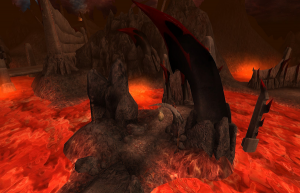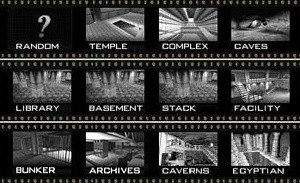I like to fight as much as the next person who grew up with video games, but I find I’ll often avoid combat when I can. Not in the style of oh, let’s run past these guys when playing Destiny, for efficiency’s sake… it’s more the thrill of finding a way around time-wasting enemies.

I think I finally started doing this with purpose sometime around The Elder Scrolls IV: Oblivion, when I got tired of going through the gates and using up items fighting daedra on the paths. I have a terrible sense of direction, and if I didn’t pay careful attention, I’d spend far too long just wandering around, fighting unnecessarily, so instead I mastered spidering across walls and edges, and in that way I would make my way to the towers. With water-walking boots and resist fire gear, I could even cross the occasional lake of fire without issue. I probably spent as much or more time gathering gear and figuring out the safest ways through each Oblivion map as I would have fighting, but there was a particular thrill that came with successfully avoiding enemies who wanted my head on a spear. In Skyrim, my tactic was different; I would spend the first several hours of a playthrough leveling blacksmithing until I could make weapons so strong it didn’t matter what came at me. This was a different method for getting around gameplay, but the idea at the center was the same. After all, it’s not really combat when you’re parting enemies like butter.
After Oblivion, I started noticing my habits more, and playing to them (probably one of the reasons I so love Dishonored), but as I look back, I’ve always hunted the shortcut (or long way) that allowed me play my own way. I may think sneak mode often looks silly, but despite my real-life impatience, if a slow crawl around a perimeter will get me from one place to another unseen, I will slow-crawl for long minutes, nudging the thumbstick on a controller forward with all the pressure and strength of a butterfly. It’s not just stealth games, either, that reward this kind of patience; even back in the early Super Mario Bros. games, the path of least resistance was often the path of going over and around rather than directly jumping on or shooting enemies. Saving a P-Wing for the right level and drifting on through like a boss was the best feeling.
This tendency may have been why I was less than enthused over a Final Fantasy VII remake. I’ve picked up newer Final Fantasy games, and past remakes, but the charm of random and/or unavoidable battles is long gone for me. I will skirt far and wide around a visible enemy just to prove I can, and I love testing the range of an enemy’s senses and finding out just how close I can get without triggering a fight, something that just isn’t possible with random battles. It’s also one of the reasons I was disappointed with Dying Light. I’d hoped to just go over and above everything, whenever possible, but no such luck — you just can’t shake some of those guys, though boy did I spend some time trying. I learned more about the environment while running away than I did while completing missions. Still, it wasn’t quite the roof-climbing, enemy-avoiding experience I wanted, and I couldn’t remake it as much as I wanted, either.
And that’s what I’m always looking for, I think: my own path, a way to make a game my own. But this tendency raises two questions: first, what does this mean for me in terms of games in general, and combat in specific (do I dislike it?), if so, what’s that leave in most games, and second, do I miss out on essential elements of gameplay by skipping and finding other ways to do things?

To address the first question: I don’t think I dislike combat for combat’s sake — in fact, I will often choose fighting classes when a choice is offered (though I do love sniping, speaking of patience; I will hang back and pick off enemies as long as they keep spawning and I have ammo), and there are plenty of games I’ve loved in which combat is the very crux of the game, like the Halo franchise, or my beloved State of Decay, in which fighting zombies is pretty unavoidable. One of my earliest real experiences spending months and months playing the same game, after all, was GoldenEye — still an all-time favorite for the sheer fun of multiplayer combat, even though the world has moved on to better weapons and better use of polygons. So I can’t even say it’s repetition that bugs me. But the more I think about skipping combat in games like The Elder Scrolls, the more I ask… then why even play? Am I really playing, if mostly I get a thrill from collecting items and stealing a city dry? If becoming a master thief is how I get my jollies and finishing quests becomes a sideline? Sure I’m playing… though I can’t help but wonder how my life might have been different if, instead of playing the market and trying dozens of strategies to maximize profits in two years of Final Fantasy XI, I’d instead put those monthly fees into an account so I could later play the stock market.
C’est la vie. If nothing else, roleplaying games taught me a lot about virtual lock-picking and how to gauge a market’s needs.
The other question, though, is trickier. If I’m hellbent on making my own way in a game, am I missing out on the essential experience designed by development teams? I’m not alone, for instance, in choosing mainly to build in The Sims franchise or in Minecraft; plenty of people, like me, aren’t much interested in gameplay over construction in those titles. But I’ve never finished the main questline in an Elder Scrolls game, for example. Every time I play, I put 50, 60, 70 hours into side quests and stealing and crafting and leveling, and by the time I get back to the main game, it’s so easy that I can’t be bothered. In those cases, I am definitely missing out on something, and that something is the main game. But if I’ve still enjoyed myself (frankly debatable in Skyrim, but that’s an argument for another day), does it matter?

And that’s the real question: does it matter? The wonderful thing about video games is that we can make them our own, even if it’s just a matter of turning the volume up, changing the brightness, or choosing whether to tone down blood, gore, and death animations — or skipping an entire area in a Fallout game because, man, there are Deathclaws over there. Sometimes this means we’re really muddying the waters, and ignoring the hard work of developers, but even as we change games and find alternate paths and skip a fight or two, we are only changing our own experiences, not the artifacts themselves. They’re still there, waiting for the day when we say, okay, Deathclaws: it’s on.





2 thoughts on “Let’s Go Around: Combat Avoidance in Gaming”
I was thinking a lot about combat avoidance playing SOD. I like fighting when it makes a difference. If I can clear out a room or town and it will stay pretty cleared out, I will spend hours doing that. With SOD though, no matter how many zombies I kill, they just keep coming. I wonder if they did that on purpose to get at that feel of the “neverending horde” that is the theme in most zombie movies. After several hours of gameplay though, especially since you don’t get loot from kills, I have started avoiding the hordes. I creep around quite a bit and try to avoid conflict. When I played Kingdoms of Amular, I did the exact opposite. You got loot and skill from kills, so I always engaged the wolf pack at the edge of the path. I feel engaged with both games, though I do feel really connected to KoA, probably because that killing was so meaningful.
Oddly enough, I never spent time building in Sims; that seems like the most boring part of the game. I want to amass as much wealth and skills as possible. In light of your questions, though, I wonder if I missed out on a lot of the game because of that. Anywho, loved the post!
It’s weird, because I am usually ALL ABOUT money, but in the Sims, I just don’t care at all about the game. And even though I’m usually about loot, killing in State of Decay is its own reward for me. Every downed zombie is a victory. I get really protective of my good cars on higher levels of Breakdown, though — that’s when I start creeping around stuff in cars and trying to avoid hordes.
Skill from kills is a different thing. I will still avoid in those instances (xp and all) when possible because I feel like I will usually level up enough anyway.
Gaming is strange, man.